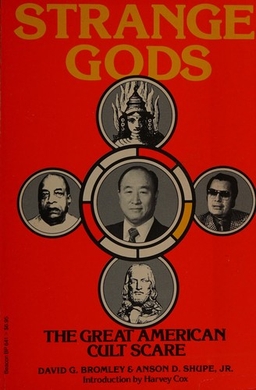Related Research Articles
Deprogramming is a controversial tactic that seeks to dissuade someone from "strongly held convictions" such as religious beliefs. Deprogramming purports to assist a person who holds a particular belief system—of a kind considered harmful by those initiating the deprogramming—to change those beliefs and sever connections to the group associated with them. Typically, people identifying themselves as deprogrammers are hired by a person's relatives, often parents of adult children. The subject of the deprogramming is usually forced to undergo the procedure, which might last days or weeks, against their will.

The Cult Awareness Network (CAN) was an anti-cult organization founded by deprogrammer Ted Patrick that provided information on groups it considered "cults", as well as support and referrals to deprogrammers. It operated from the mid 1970s to the mid 1990s in the United States.

Eileen Vartan Barker is a professor in sociology, an emeritus member of the London School of Economics (LSE), and a consultant to that institution's Centre for the Study of Human Rights. She is the chairperson and founder of the Information Network Focus on Religious Movements (INFORM) and has written studies about cults and new religious movements.

A new religious movement (NRM), also known as alternative spirituality or a new religion, is a religious or spiritual group that has modern origins and is peripheral to its society's dominant religious culture. NRMs can be novel in origin or they can be part of a wider religion, in which case they are distinct from pre-existing denominations. Some NRMs deal with the challenges which the modernizing world poses to them by embracing individualism, while other NRMs deal with them by embracing tightly knit collective means. Scholars have estimated that NRMs number in the tens of thousands worldwide. Most NRMs only have a few members, some of them have thousands of members, and a few of them have more than a million members.
Cult is a term, in most contexts pejorative, for a relatively small group which is typically led by a charismatic and self-appointed leader, who excessively controls its members, requiring unwavering devotion to a set of beliefs and practices which are considered deviant. This term is also used for a new religious movement or other social group which is defined by its unusual religious, spiritual, or philosophical beliefs and rituals, or its common interest in a particular person, object, or goal. This sense of the term is weakly defined – having divergent definitions both in popular culture and academia – and has also been an ongoing source of contention among scholars across several fields of study.
David G. Bromley is a professor of sociology at Virginia Commonwealth University, Richmond, VA and the University of Virginia, Charlottesville, VA, specialized in sociology of religion and the academic study of new religious movements. He has written extensively about cults, new religious movements, apostasy, and the anti-cult movement.
The anti-cult movement consists of various governmental and non-governmental organizations and individuals that seek to raise awareness of cults, uncover coercive practices used to attract and retain members, and help those who have become involved with harmful cult practices.
Cyril Ronald Vosper was an anti-cult leader, former Scientologist and later a critic of Scientology, deprogrammer, and spokesperson on men's health. He wrote The Mind Benders, which was the first book on Scientology to be written by an ex-member, and the first critical book on Scientology to be published.
Ronald M. Enroth was an American professor of sociology at Westmont College in Santa Barbara, California, and an evangelical Christian author of books concerning what he defined as "cults" and "new religious movements" and important figure in the Christian countercult movement.
The academic study of new religious movements is known as new religions studies (NRS). The study draws from the disciplines of anthropology, psychiatry, history, psychology, sociology, religious studies, and theology. Eileen Barker noted that there are five sources of information on new religious movements (NRMs): the information provided by such groups themselves, that provided by ex-members as well as the friends and relatives of members, organizations that collect information on NRMs, the mainstream media, and academics studying such phenomena.
Jean-Marie Abgrall is a French psychiatrist, criminologist, specialist in forensic medicine, cult consultant, graduate in criminal law and anti-cultist. He has been an expert witness.
Saul V. Levine is a Canadian psychiatrist and author, professor emeritus at various universities for psychiatry at University of California, San Diego, School of Medicine; Stanford University Medical School; and University of Toronto (1970–1993). He was chairman of the Department of Psychiatry at Rady Children’s Hospital, San Diego, from 1993–2011. He was department head of psychiatry at Sunnybrook Medical Center in Toronto, Ontario, Canada.
Theodore "Ted" Roosevelt Patrick, Jr. is an American deprogrammer and author. He is sometimes referred to as the "father of deprogramming."

The Family Survival Trust (FST) is a charity registered in the United Kingdom, established in order to support and offer counselling for members of abusive cults, religions, and similar organizations, and their families members.

INFORM (Information Network Focus on Religious Movements) is an independent registered charity located in the Department of Theology and Religious Studies at King's College, London; from 1988-2018 it was based at the London School of Economics. It was founded by the sociologist of religion, Eileen Barker, with start-up funding from the British Home Office and Britain's mainstream churches. Its stated aims are to "prevent harm based on misinformation about minority religions and sects by bringing the insights and methods of academic research into the public domain" and to provide "information about minority religions and sects which is as accurate, up-to-date and as evidence-based as possible."
The "New Cult Awareness Network" is an organization that provides information about cults, and is owned and operated by associates of the Church of Scientology, itself categorized in many countries as a cult. It was formed in 1996, with the name purchased from the now defunct Cult Awareness Network, an organization that provided information on groups it considered to be cults, and that strongly opposed Scientology.
Cultists Anonymous (CA) was a British anti-cult organization made up of ex-cultists from Family, Action, Information, and Rescue (FAIR), Britain's largest anti-cult organization. CA formed in 1985 but rejoined FAIR in 1991. CA's leaders generally remained anonymous to avoid intimidation from new religious movements (NRMs). However, George D. Chryssides, a British religious studies scholar, believes that Lord John Francis Rodney, 9th Baron Rodney (Lord Rodney) was the leader of the group.
Martin Faiers is a British deprogrammer and former official in the Unification Church in Canada. He was born in Grimsby, Lincolnshire. His family members are publishers of This England, a quarterly magazine about small-town and country England. According to scholar Elisabeth Arweck, Faiers lives in southern France and works in the Spanish deprogramming "market." In addition to being a deprogrammer, he also organized for several years a UK organization called Council on Mind Abuse.

Strange Gods: The Great American Cult Scare is a 1981 nonfiction book by Anson D. Shupe and David G. Bromley about the "cult scare" in America in the 1970s. It was published by Beacon Press in Boston. Shupe and Bromley analyze six specific new religious movements (cults) – the Unification Church, the Church of Scientology, the Children of God, the Divine Light Mission, the International Society for Krishna Consciousness, and the Peoples Temple – in order to partially dispel myths about them.

Cult Controversies: The Societal Response to New Religious Movements is a 1985 nonfiction book by James A. Beckford on the reaction to new religious movements (cults) in America, Britain, France, and Germany. It was published by Tavistock Publications in London and New York. Beckford covers the literature and sources on various new religious movements (NRMs) in various places, but also the various reactions that non-NRM members had to their sudden presence in different societies, including America, Britain, France, Germany, and Japan.
References
- 1 2 3 "POWER aims to destroy cults". Gazette and Post (Acton). 1976-11-04. p. 6.
- 1 2 3 Arweck, Elisabeth. Researching New Religious Movements: Responses and Redefinitions (London and New York: Routledge, 2006), 129.
- ↑ Chryssides, George D., "Britain's anti-cult movement," in New Religious Movements: Challenge and Response, edited by Jamie Cresswell and Bryan Wilson, 257–73. London and New York: Routledge, 1999. p. 259.
- ↑ Beckford, James A., Cult Controversies: The Societal Response to the New Religious Movements (London: Tavistock, 1985), 228–9.
- 1 2 3 4 Horsnell, Michael, "Alleged offer of brainwashing training: Yard's interest in anti-cult body," The Times (London), 4 April 1977.
- ↑ "New focus on man with a strange battle", Southall Gazette, 8 April 1977.
- ↑ Beckford, Cult Controversies, 228.
- ↑ James A. Beckford. "'Brainwashing' and 'Deprogramming' in Britain: The Social Sources of Anti-Cult Sentiment". In The Brainwashing/Deprogramming Controversy: Sociological, Psychological, Legal and Historical Perspectives, edited by David G. Bromley and James T. Richardson, 122–38. Studies in Religion and Society. New York and Toronto: Edwin Mellen Press, 1983.
- ↑ "Campaign Against Cults". Gazette and Post (Acton). 1976-06-10. p. 2.
- ↑ Warschauer, Harris and Wooding, Dan, "A sinister anti-Christian brainwashing sect has been set up in Britain", The Sunday People (London), 14 November 1976.
- 1 2 Beckford, Cult Controversies, 230.
- ↑ Leduc, Jean-Marie and de Plaige, Didier, Les Nouveaux Prophètes. Paris: Buchet/Castel, 1978. pp. 345–56.